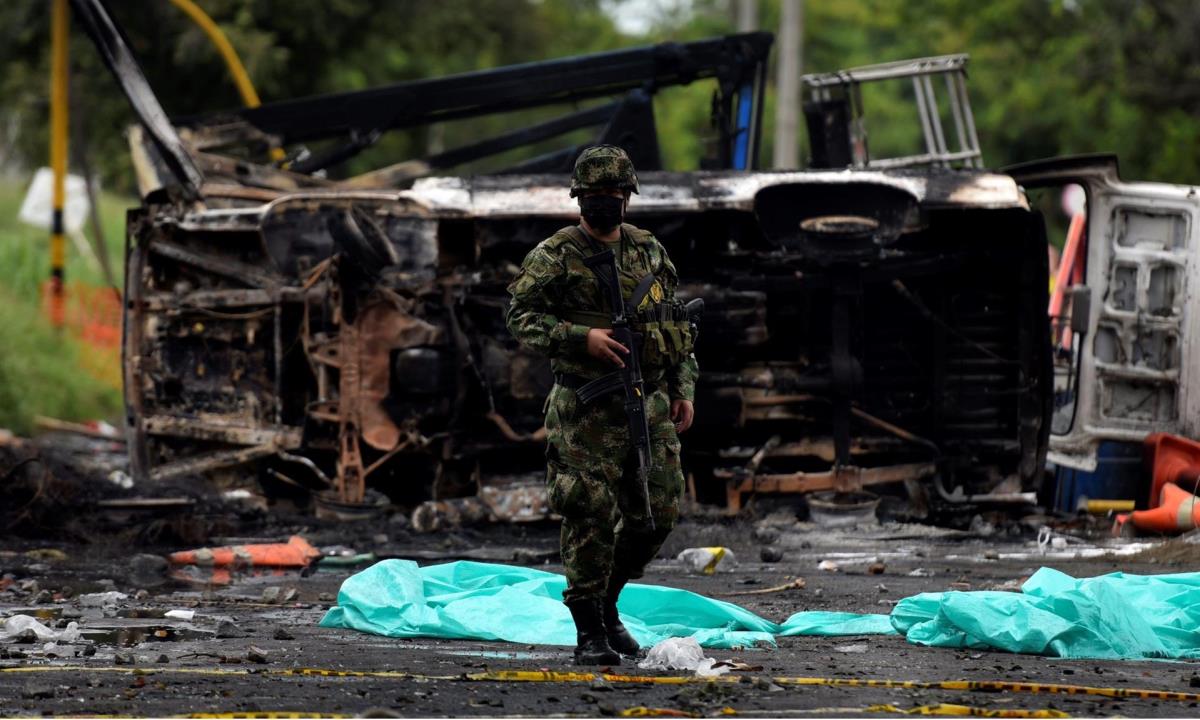RIO DE JANEIRO, BRAZIL – A tense calm on the eve of the fourth day of the national strike against the Government is experienced this Tuesday, May 18, in Colombia after President Iván Duque ordered security forces to lift the road blockades with which the protesters prevent supplies in several regions of the country.
“The great mobilization of this Wednesday was already scheduled, but the Government is still determined not to guarantee the protection of peaceful demonstrations and sends the Army to repress them,” said the General Secretary of the Central Unitary Workers’ Union of Colombia (CUT), Diogenes Orjuela.

After 20 days of protests that have left more than 40 dead, most of them attributed to police brutality, President Duque, in a statement he gave last night, ordered the security forces to deploy their “maximum operational capacity” to unblock the roads blocked by the demonstrators.
According to the head of state, the order must be agreed with the mayors and governors so that “within proportionality and strict compliance with human rights and their protection, they allow all Colombians to recover mobility, recover well-being.”
GUARANTEES FOR PROTEST
The guarantees that the National Strike Committee demands from the Government for the demonstrators have become the main obstacle for the parties to set up a negotiating table to find solutions to a crisis dragging on for 20 days.
On April 28th, protests began in Colombia in which thousands of people have taken to the streets to demand the Government’s already withdrawn tax reform.
As the days went by, the demonstrators started to demand the Government stop police brutality, to which social organizations such as Temblores attribute 43 homicides “allegedly by the Police”.
They also demanded the withdrawal of the health reform bill, which contemplates privatizations, the strengthening of mass vaccination, and a basic income of at least one legal monthly minimum wage.
“It is known that the main issue (before formally installing the negotiating table) is the issue of the guarantees that have not been given”, maintains Orjuela, who says that the Government has responded with what he called a “diffuse discourse”.
The union leader alleges that the signals sent by Duque, as happened with last night’s statement, are wrong because he supposedly orders the Army to go out to the streets and does not mention “at all” that during the protests “people have died, there are numerous wounded, mutilated and sexual abuse”.
PERSIST IN THE DIALOGUE
Despite the alleged wrong signals from the Government, the Strike Committee says that they will persist in dialogue and negotiation with the Executive branch.
In this direction, Orjuela assured that although the Government is “throwing firecrackers” at the installation of the dialogue and negotiation table, “we will attend as many meetings as we have to go to” because they say they are sure that the solution to the situation is to “talk” and “negotiate”.
He also argues that the road will not be easy because there are also “other sectors” -to which he did not refer specifically- but of which he said they have “extreme positions and do not want there to be negotiations.”
However, he trusted that with the mediation of the Church, the UN, and the head in Colombia of the Office of the UN High Commissioner for Human Rights, Juliette de Rivero, the differences could be overcome to move forward.
Unlike the Government that, according to Orjuela, does not condemn police brutality or recognize violence against demonstrators, the Strike Committee “always, always” has rejected “all acts of vandalism and violence”.
“Our convocations have always been and will always be peaceful, colorful, with biosecurity measures due to the pandemic,” insists Orjuela.
The next meeting between the parties is agreed for Thursday, one day after the new “national strike”, the fourth to take place in the protests. So far, the parties have had two meetings, but no white smoke has emerged to set up the negotiating table.
COSTLY LOSSES
The Colombian government estimates that since the protests began, the losses to the country’s economy are around 6.5 trillion pesos (about US$1.8 billion).
That is why he insists that the roads must be unblocked because, according to Duque, “there is no right in Colombia to obstruct roads, no right to affect the rights of others, no right to limit the food, supply, and welfare of our families”.
For its part, the mayor’s office of Bogotá reported today that in three weeks of protests, 139 Transmilenio transit stations and more than a thousand buses of the capital’s public transport had been damaged by vandals.
“This is not minor damage. What we have seen throughout these days is a process of destruction of the infrastructure of Bogota’s mass transit system, which cannot be understood as a form of protest,” said the mayor temporarily in charge of Bogotá, Alejandro Gomez, who replaces Mayor Claudia Lopez, who is recovering from the coronavirus.

